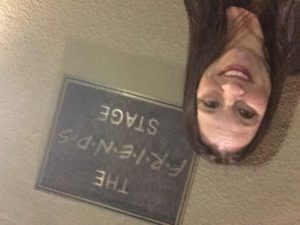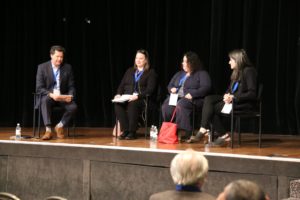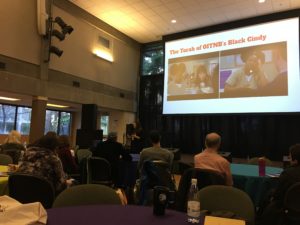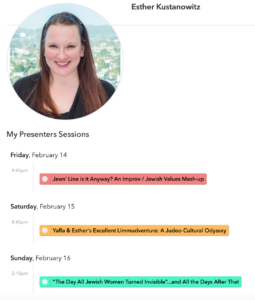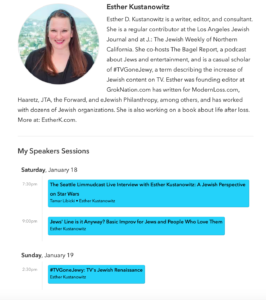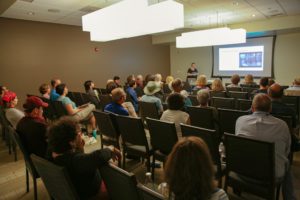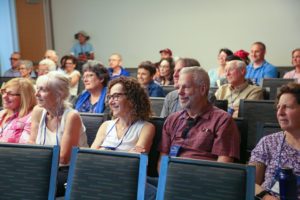Big Ideas

The One With the Lessons We Learned: A Jewish Look Back on ‘Friends’
0Over Memorial Day Weekend, fans of the TV show Friends received a long-awaited reunion of the six main cast members, who played Ross, Rachel, Monica, Chandler, Phoebe and Joey for 10 seasons over 11 years on NBC. The show broke ratings and popularity records during its time on the air, and was resurrected to entertain a new generation, first on Netflix and then as one of the Warner properties to anchor HBO Max. Reviews of the reunion, which is now streaming on HBO Max, have been understandably mixed; how could a reunion satisfy millions of rabid fans around the world 17 years after the series concluded? But many tuned in for the nostalgia factor, an opportunity to say “Remember when…??” along with the actors who gave the memorable scenes their life and longevity.
Friends wasn’t identified as problematic when it aired, the decade from 1994-2004, an era before any of us had heard the term “wokeness.” But we knew that the world of Friends was pretty monochromatic and non-diverse, with more than a few storylines and jokes that crossed into homophobia or fat-shaming. And the Jewish moments–especially a Holiday Armadillo taking Santa’s place in the life of a two-faith family–were few, farfetched and fraught.
But Friends captured a moment for a generation–those of us who transitioned from college to real life around the same time as these Friends of ours. Although Chandler the character was fictional, he worked in the Manhattan high-rise three buildings down from where I non-fictionally worked at Hadassah. On one Hadassah lunch hour, I saw the non-fictional actor Matthew Perry in Central Park, followed him around a bit, introduced myself (why?) and hyperventilated back at the office.
When new episodes premiered, a group of us got together to watch; when we were able to consume the show in reruns, the tribe expanded, then again when we had access to YouTube clips, GIFs and Etsy stores of unlicensed merch. But beyond the relationships, the catchphrases, the actors and writers, were the life lessons that could be gleaned from the sitcom, if you looked for deeper meaning within.
- Insider language makes some people feel included, except for everyone who feels excluded. Some of us watched so often that it altered our pronunciation of certain words and phrases: “we were on a break,” or “how you doin’?” or even a single word like “lobster” or “London!” Some of us may feel the need to correct people claiming their name is “Josh” to “JoshuAH,” a hazard in Jewish professional circles because of the extremely high Josh density. But it’s a reminder to know your audience and define unfamiliar terms–whether it’s what it means to “pull a Monica” or explaining the story of Hanukkah–to ensure accessibility to those who have different experiences than your own.
- It’s important to read the whole thing before you express your agreement. Rachel gave Ross a letter to read–”18 pages, front and back”–to see if he was sorry for how he behaved when they were ON A BREAK; he famously fell asleep before finishing it, which led to trouble later on. First of all, 18 pages? I see you, Jewish number. Secondly, imagine if people really behaved this way, circulating articles they hadn’t read, or hadn’t read through! What a world THAT would be.
- Even if you’re an expert in something, you can always learn something. A Danish-Israeli friend insisted one Friends episode had mentioned that Ross and Chandler had stayed in Kiryat Moriah, a neighborhood in Jerusalem, while visiting Israel. I knew Friends! She had to be wrong. But she wasn’t. (The clip is available on YouTube.) And it left me wondering about Ross and Chandler’s Israel trip: why they went and on what program, where else they visited, if they went to the Dead Sea or Yad Vashem, or partied awkwardly in Tel Aviv. You know, the usual questions.
- If something scares you, put it in the freezer. While the Friends freezer already contains copies of The Shining and Little Women, I believe there’s room in there for the Israeli-Palestinian conflict; I think I can squeeze it in there, between anti-Semitism and post-COVID dating…
- Babies do sometimes have the strangest taste in music. Rachel and Ross discovered that the only song that could get baby Emma to stop crying was “Baby Got Back.” As a baby, my brother used to hum songs from the Chassidic Song Festival. I used to sing “Sweet Child O’ Mine” to my friend’s baby. Spotify, which reports to me on my friends’ listening habits, identified a friend as a repeat listener to the theme from Schindler’s List; she later explained it was the only thing that lulled her infant to sleep. Kids are fascinating.
- The honest truth is so rare that when we see it, we want more. Phoebe’s “inappropriate” children’s songs–covering topics like grandparent mortality, bisexuality and where meat comes from–peeled back the curtain to reveal the truth that the kids always suspected was there, but hidden by their fearful or well-meaning parents. What truths would we want Phoebe to share with us, as a Jewish community or as a society, with her songs for 2021?
There are many other miscellaneous lessons: Ross’s leather pants taught us that lotion + powder = paste. Monica taught us that aunts should always have gum. Rachel taught us that if your cookbook pages are stuck together, your classic trifle will have layers of ladyfingers, jam and beef sauteed with peas and onions. Chandler reminded us that in every group of friends, there’s at least one whose job is a mystery; he may be handling the WENUS, but that doesn’t make him a transponster because that’s not even a word. Phoebe is unapologetically odd, quirky and unique, and Joey–like Rabbi Hillel does in the Passover seder–reminds us of the value of sandwiches.
If you’ve read this far, you’re probably one of us, a person who has shared the memorable moments with their own friends and created community around a TV show or another cultural text as source material. So you understand: when you’re in close community with people who know you well, even small or nonsensical moments –whether it’s throwing a ball around for hours; watching TV with your bestie, a chick and a duck; or talking Jewish community issues and politics–can be an enthrallingly good time. And it’s because you’re protected by the covenant of your friendship: they’ll be there for you, and you’re there for them too.

New Year, New TVGoneJewy Sessions
0 TVGoneJewy, a program exploring the increase of Jewish content on television, started as an in-person program at various Jewish conferences. When the pandemic hit, the class transitioned to Zoom and entertained hundreds of people virtually at nearly a dozen programs during 2020.
TVGoneJewy, a program exploring the increase of Jewish content on television, started as an in-person program at various Jewish conferences. When the pandemic hit, the class transitioned to Zoom and entertained hundreds of people virtually at nearly a dozen programs during 2020.
TVGoneJewy is coming to even more Zoom screens in 2021 – see below for finalized dates, times and registration links when available. (All times are Pacific – let me know if you can’t do the math. :))
Want to follow some TVGoneJewy posts? Or want to connect about hosting a TVGoneJewy program for your community? Connect, check out posts and converse at Twitter.com/TVGoneJewy and Facebook.com/TVGoneJewy.
2021
Thursday, January 14, 4:30pm – Congregation Shaarey Zedek in East Lansing, MI (adults)
Sunday, January 17 – Congregation Shaarey Zedek in East Lansing, MI (invite only – teens)
Saturday evening, January 23 – Temple Emanuel of Beverly Hills (invite only – Havdalah and program)
Wednesday, March 17, 4pm – University of Connecticut, Jewish Studies Department (public program)
2020
Temple Chizuk Amuno, Baltimore, MD – December 2020
Community Scholars Program of Orange County, CA – December 2020
Special Program for Jewish clergy: Heshbon Heshvan – October 2020
Hebrew Helpers, Los Angeles, CA – September 2020
Congregation Rinat Yisrael, Teaneck, NJ – August 2020
Hollis Hills-Bayside Jewish Center, NY – August 2020
Genesis Program @ Brandeis University – July 2020
Limmud eFestival – May 2020
LimmudNY Fest – February 2020
Limmud Seattle – January 2020
After You’ve Watched Hamilton: Pop Culture to Consume This Weekend
0
Schindler’s List is also now available on Netflix.
Airplane (Netflix) – The “Air Israel, please clear the runway” scene is a broad, blink-and-you-miss-it moment, but one of the first times I’ve ever remembered seeing “Israel” even get a mention in a big film, much less in a comedic context.
Fiddler on the Roof (Netflix) – Hurry up and watch the original before they remake it. Why? Because it’s TRADITION.
Spaceballs (Netflix) – If you’re a Druish American Princess who’s been looking for a new password for her Royal Highness’s matched luggage, why not try the combination an idiot would have on his luggage?

Get Angry, Then Get Inspired to Work for Justice
Whether your justice work centers on journalism/identifying clergy abuse (Spotlight), ensuring that there’s appropriate diversity in trans representation on screen (Disclosure) or fighting against entrenched, systemic racism, especially in the the criminal justice system (13th), Netflix has the docs to get you educated and fired up about equality.
Netflix also has a nausea inducing four-part series about Jeffrey Epstein, but with that story back in the news this week as Ghislaine Maxwell was arrested, maybe it’s worth looking at how incredibly horrifying the “Ponzi sex scheme” of teenagers truly was, and how he got away with it for so long. Or maybe it’s not, I’m kind of nauseated just talking about it. While it’s possible Epstein’s suicide provided some victims with some relief that their predator was literally removed from the earth, others know that he never got the legal justice he deserved. Perhaps we just need to look at the Epstein story as cautionary tale: just as we know the criminal justice system doesn’t work for the most impoverished, trapping them in a cycle of reincarceration, disproportional sentencing and desperate criminality, we also know that wealth and prominence may be able to dismiss charges and allow perpetrators to roam free to perpetrate again with no consequences. The system needs equalizing. We can’t solve it all this weekend, but getting educated–and getting angry about inequity–is a good start.
Pay Tribute to Carl Reiner
- The Man With Two Brains & Dead Men Don’t Wear Plaid (written by Reiner), The Jerk, All of Me and Oh God! (directed by Reiner) – all available for rental (All of Me may be available on HBO)
- Oceans 11, 12 & 13 – available for rental
- Blazing Saddles
- CBS is airing two episodes of the Dick Van Dyke show in Reiner’s memory.
Watch The Film That Predicted [Waves Hands Around Wildly] THIS
Idiocracy, the Mike Judge film about the stupidification of America and the downfall of our society, arrives July 4 (free on Hulu, or as a rental). Cautionary tale? A prediction of our now-foreseeable future? You be the (Mike) Judge.

March 29: TVGoneJewy at Limmud North America eFestival (digital)
0 Honored to be presenting “TVGoneJewy: TV’s Jewish Renaissance” in this first ever Limmud North America eFestival, featuring 50 educators, thought-leaders and change-makers teaching about today’s most interesting Jewish ideas!
Honored to be presenting “TVGoneJewy: TV’s Jewish Renaissance” in this first ever Limmud North America eFestival, featuring 50 educators, thought-leaders and change-makers teaching about today’s most interesting Jewish ideas!
For more information or to register: https://www.limmudna.org/efestival

Netflix-and-Kvell-and-Purell: Jewish-Themed & Israeli TV to Watch While Quarantined
0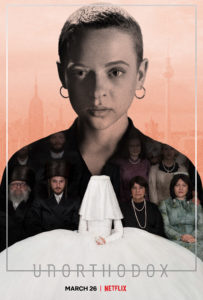 If you’re quarantined, self-quarantined or just playing it safe and socially distant, you’re probably logging a lot of hours on devices consuming entertainment.
If you’re quarantined, self-quarantined or just playing it safe and socially distant, you’re probably logging a lot of hours on devices consuming entertainment.
Good news is that there’s lots of content to choose from: here’s my first list (of undoubtedly several) to keep you entertained while you’re staying safe and the world figures out what’s next.
Comedy? Drama? A combination? Brand new shows and classic films?
Check them all out here at the J..

January 2020 is in the books; here’s to February!
0Thrilled to have kicked off January with two speaking engagements on subjects near and dear to my heart. (Why are things always near and dear? Because they rhyme they always have to go together?) At Limmud Seattle, I got my TVGoneJewy on, talking about Jewish representation on the big and small screen, and at the Z3 conference, I spoke on behalf of civility on social media, especially in Jewish conversations and surrounding issues relating to Israel.
The Bagel Report was back with three new episodes in 2020, tackling pop culture topics like Friends, the West Wing, Batwoman, the Oscars, other awards shows and Star Wars. Check out those episodes and subscribe here.
You can also listen to my “Star Wars and Judaism” Limmudcast below.
As always, publishing in lots of places. Here are some recent highlights:
- Jewish Emojis We Need for Today’s Jewish Identity (The Forward, paywall)
- Daf Yomi Fever: How Daily Talmud Study Is Sweeping the Nation (Jewish Journal)
- The Potential of Alternate Universes (Jewish Journal)
- After ‘The Jewish Women Turned Invisible,’ Voices are Quietly Emerging (EJewishPhilanthropy.com)
- The Logistics, Wins and Losses of Jewish Conference Inclusion (EJewishPhilanthropy.com)
In February, the Limmud tour continues with Limmud NY, President’s Day Weekend (February 14-17)– see below for sessions. You can still register to attend at limmudny.org.)
Now booking gigs for March-December 2020, so be in touch! Thanks for staying connected to the world of EstherK…

Coming in 2020 – to Seattle & Beyond!
0Ending 2019 with two bookings for January, at Limmud Seattle and the Z3 conference in Los Angeles…details and links are below.
Plus, more episodes of the Bagel Report podcast, plus articles galore (Articles Galore is my Bond Girl name) at the J and the Jewish Journal, and more!
So stay tuned and have a wonderful new year!

Guesting on the I’m Not Joking Podcast
0 I love being a guest on podcasts. I’m not joking! And I’m definitely not joking about the fun I had being a guest on the I’m Not Joking Podcast.
I love being a guest on podcasts. I’m not joking! And I’m definitely not joking about the fun I had being a guest on the I’m Not Joking Podcast.
An honor to talk with behavioral scientist Peter McGraw about pop culture; comedy; when is #toosoon when it comes to joking about tragic events; comedy lessons for leadership; grief writing and so much more. Here’s a sample from the transcript (link to audio is below):
Peter McGraw: I do like this idea that we’re all supporting actors. The best improvisers embrace that idea is that if we all take on that role, we create something special where everybody has a chance to stand out, but it comes from someone else.
Esther Kustanowitz: “Also in life and community building, that’s the ideal as the feeling. It goes back to a Jewish concept, which I always have to arh back to because, hi, I’m me: the idea that we’re all responsible for each other. This is something that I’ve used when I’ve taught some improv workshops that are very basic improv rules in the context of short-form games, but also juxtaposed with principles of Jewish community building. Like, “we are all responsible for each other,” or you shouldn’t take yourself outside of the community. You should feel that you’re always a part of it. You don’t rely on a miracle. You give everything you can to a scene so that it goes. You don’t just wait for somebody to rescue you.
If we all viewed ourselves–whether we are the leaders or the followers, depending on whatever your community is, whether it’s an office environment or if it’s a youth group or social group–the idea that everybody’s an equal part of the group is not always assumed, and not always the operating point for a lot of people. The idea that there’s no leader of the group that like you’re part of the group, that everybody’s bringing their own stuff and their own brains to the group. Improv has also taught me if you have an idea for something and you’re working in a group context, it’s fine to have an idea but you also have to be open to other people’s ideas. If the idea that emerges that is better is not yours, you have to let go of your ego and go along with it.”
For more listen below.

Going Long with TVGoneJewy at Limmud Bay Area Festival
0I arrived at Sonoma State University for the Limmud Bay Area Festival, excited about presenting three sessions to the attendees. But there was one lurking worry: that my first presentation was too long.
I had 70 minutes to cover “TV Gone Jewy” – the exploration of various scenes from contemporary television that mentions Jewish things or talks extensively about Jewish identity. But I definitely had more than 70 minutes of material. I went through the presentation and trimmed – starting clips when the Jewy things happened instead of at their start to provide context, cutting slides here and there. I had also built in about ten minutes at the end for conversation. I could do it in 70 minutes, I thought.
As we met that Friday afternoon as the Jewish conference/festival, gathering several hundred community learners interested in unfiltered or unaffiliated Jewish learning, began, I looked out at the room, about 40 attendees of all ages, Jewish identities and backgrounds and breathed. Here we go.
I spoke quickly, in tribute to my east coast roots, and before I knew it we were at 60 minutes.
“How are we doing on time?” I asked the crowd. “Have a few more minutes?”
“Keep going!” the crowd urged.
“OK,” I said, “but if you need to leave to go to another session, or for whatever reason, we can officially end the session and if people want to stay, you’re welcome but not required. I’ll keep going for whoever stays!”
About five people walked out, waving, smiling and saying thank you. The rest of us continued…for another hour. About 25 people stayed to the very end.
That was just the beginning.

May The Faiths Be With You: An Interfaith Star Wars Panel
0A Jew, a Christian and a Muslim walked into the Scum & Villainy Cantina in Hollywood to talk about the panel they were doing about Faith and Star Wars. And then, a few weeks later, they walked into a synagogue in Los Angeles, to do that panel on Faith and Star Wars!! This was fun! Check out the video excerpt of my opening comments below…
